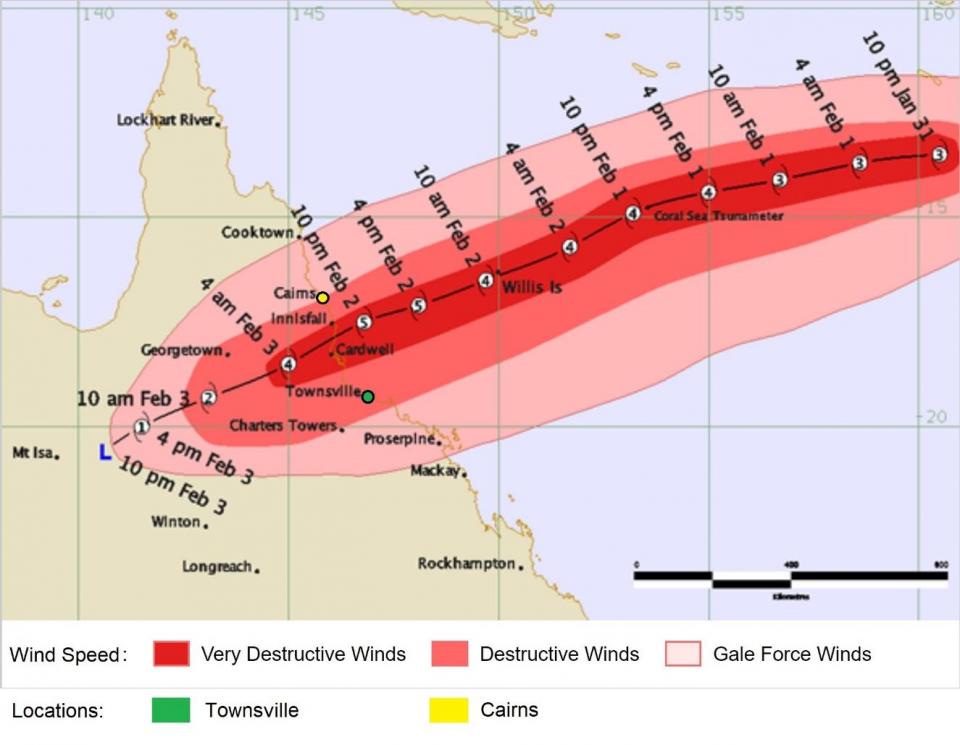
PUBLICATIONS
Published works

Investigating the psychological factors that influence cyclone mitigation behaviour
| Title | Investigating the psychological factors that influence cyclone mitigation behaviour |
| Publication Type | Thesis |
| Year of Publication | 2020 |
| Authors | Scovell, M |
| Academic Department | College of Healthcare Sciences |
| Degree | Doctor of Philosophy |
| Number of Pages | 280 |
| Date Published | 10/2020 |
| University | James Cook University |
| City | Townsville |
| Keywords | cyclone mitigation behavior, cyclone preparedness, cyclones, fringe experience, hazard intrusiveness, hazard-related attributes, protection motivation theory, protective action decision model, Risk perception |
| Abstract | Tropical Cyclones can cause significant damage to houses located in high-risk areas. In Australia, cities and towns situated on the north coast of Queensland are considered some of the most cyclone-prone communities in the country. Cyclone related property damage can, however, be reduced if the citizens of these communities perform appropriate protective behaviours. People can, for example, install structural upgrades on their houses, which improves the house’s ability to withstand cyclonic winds. There is also a range of short-term preparedness behaviours that have been shown to effectively mitigate cyclone related property damage. Though, to date, the proportion of people that perform these mitigation behaviours has been relatively low. The overall aim of this research project was to explore why some people do, and others do not, perform cyclone mitigation behaviours. Past research has shown that Expectancy Value (EV) theories help to explain whether people perform mitigation behaviours for natural hazards. However, an EV based theory has yet to be applied to explain cyclone related structural mitigation behaviour. This research project addressed this research gap by testing the extent to which an adapted EV theory helps to explain people’s intention to install cyclone shutters. An initial study showed that psychological factors within the adapted EV theory were significant predictors of mitigation behaviour. The results also indicated that an adapted EV theory can be used differentiate between different types of people and their levels of intention to install cyclone shutters. A follow up study showed that that hazard intrusiveness, perceived benefits and perceived cost were the only significant predictors of shutter installation status when controlling for other psychological, demographic and experience factors. The results indicate that when perceived benefits (i.e., the secondary benefits of a structural upgrade) and perceived efficacy (i.e., the perceived ability of the structural upgrade to mitigate harm) are considered separate constructs, only perceived benefits is a significant predictor of structural mitigation behaviour. The findings suggest that people are more likely to invest in shutters if they believe that the secondary benefits of shutters outweigh the cost. Although most EV theories suggest that risk perception influences protective behaviour, empirical research has shown that risk perception is not always a significant predictor of mitigation behaviour. This research project also tested a new method of assessing risk perception to determine if it was significant predictor of short-term cyclone preparedness behaviour. The results indicate that when controlling for objective risk and protective action perceptions, the predicted damage and anticipated negative emotions associated with that damage were both significant predictors of preparedness intention. The results suggest that it is possible to identify a relatively strong link between risk perception and mitigation intention when it is considered a dual-process phenomenon and objective risk is controlled for in the analysis. Research investigating mitigation behaviour for natural hazards also tends to show that people with experience perceive more risk and are more prepared for future events. However, the link between experience, risk perception and mitigation behaviour seems to be dependent on the type of experience. One type of experience that has not been studied empirically is that of fringe experience. The final study addressed this research gap by exploring how people who had experienced the fringe effects of a severe cyclone (i.e., experienced lesser wind speeds compared to those near the eye of storm) predicted future damage from similar cyclone event. It was found that the more people overestimated the severity of the cyclone they experienced, the less damage they predicted they would experience from a future severe cyclone. The results highlight the importance of specifying the type of experience being assessed in empirical research and that fringe experience is one type of experience can lower risk perception. The findings from this research project have several implications. The results show that different psychological factors are important for explaining different types of mitigation behaviour. It is, therefore, important for future research applying EV theories to adapt them in accordance with the type of behaviour they are attempting to explain. The findings also suggest that the link between experience, risk perception and cyclone mitigation behaviour is dependent on the way in which these variables are conceptualised and operationalised. Overall, this research project shows that how people think about cyclones and mitigation behaviours helps to explain the extent to which they prepare for cyclones. |
| URL | https://researchonline.jcu.edu.au/68936/ |
| DOI | 10.25903/rsvz-3w27 |
Published Works


